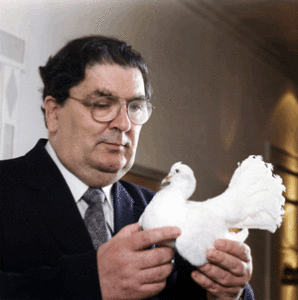[Revised 3 August 2020]
Last week John Hume was voted the Greatest Irishman in Modern History – that ruled out my hero Cúchullain. Anyway, I digress.
I have had a number of meetings with John over the years and like many other people I am quietly confident that I made no impact on him whatsoever despite being in his company and having spoken to him many times.
The opposite is not the case. Hume is one of a kind without a doubt and he made an impression on me. And I was fortunate to have spent time with him.
My first encounter was sitting having a glass of wine one Easter Sunday in a relative’s house in Donegal. John landed in, as he did, and in the course of dispatching a swift glass of wine, he responded to a question about his recently won Nobel Prize with a telling comment about his co-Laureate. The mincingly precise David Trimble.
A while later, whilst working in the University I was the senior member of staff on a ‘study’ trip to Brussels to consider the workings of the EU in person. Accompanied by a gallimaufry of students, researchers, bluffers, and academics, we flew to Belgium to meet up with ‘Tom’ John’s representative on earth, well at least in Brussels, and manouevre ourselves around the various sights of the European Parliament.
We learned several things. Firstly and this was an early lesson, that Belgian beer was tasty and like rocket fuel. The afterburn was still evident the day after the night before. Excellent fare therefore for a University outing. Secondly, that John Hume in Brussels was bigger than Bono, Paisley, Trimble, King Baudoin, you name them, they paled in comparison to John H.
We went to a function and gained entry by saying ‘John Hume sent us here’. The guys on the door didn’t give a toss about a few beer-sodden University study trippers. No, he wanted to know where John was and when he was coming. When he duly did arrive he was mobbed, and I mean mobbed. He had bother getting near the tray for a glass of red. Tom sort of snorted in the old hack fashion he had: ‘That happens all the time.’
The tour completed with John taking us to his favourite restaurant where we were all forced to eat Duck a L’orange, allegedly his favourite meal. Some of our students were less than appetised by the experience and asked where’s McDonalds. But John was steadfast, we had to eat this in this place because, well because he wanted us to.
Later we retired to an Irish Bar. The whole thing started to get a bit hazy there, but, after fulfilling a few other engagements in sallies the boul Hume, son or two in tow. Next thing he’s up with the band singing the Town I Loved So Well. Not to be outdone, I bombed onto the stage next for a rendition of A Song for the Life. JH may have had a more glittering political career, but I was the better singer and musician that night.
Subsequently, I met him in various meetings through work in the University where he held a Chair in Peace Studies. The meetings would usually be in Professor Jim Allen’s Provost’s Office where he would stand at the window, having a quick smoke having the craic before John arrived in. Then it was a genuine pleasure to sit and listen and talk about his ideas for his Chair in Peace Studies.
What was remarkable was that John Hume when you met him, wasn’t really that remarkable at all, in that he had a common touch, an understanding of others and his feet planted on the ground. He didn’t mind much who owned the ground, he frequently said we all shared it, but he knew that Brussels and the United States were fertile grounds for his ideas, for rebuilding and for future relationships to grow.
John Hume certainly made an impact on me. He mightn’t be the greatest Irishman I’ve ever met but he’s certainly up there among them. And he’s head and shoulders above the swarm of politicians north and south, unionist, loyalist, nationalist or republican that we have these days. He had his flaws, his mistakes and his detractors but he had the courage to take remarkable steps even amidst vehement criticism because he saw that only by going the extra distance could we overcome.
A lesser quoted lyric from the civil rights anthem is “We shall live in peace, some day.” At times growing up in the seventies and eighties that seemed like a pipe dream. Thank God for people like John Hume who refused to give up.

